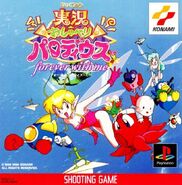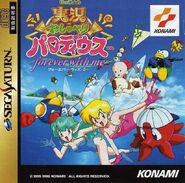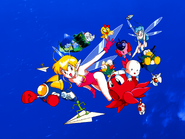Jikkyō Oshaberi Parodius (実況おしゃべりパロディウス, lit. Chatting Parodius Live!) is the fourth game in a series of parody shooters produced by Konami. The gameplay is stylistically very similar to the Gradius Series, but the graphics and music are intentionally absurd. The game, as its name would suggest, contains a large amount of Japanese voice samples shouted out in a style similar to that of a game show host. Unlike the previous two titles, Jikkyō Oshaberi Parodius was not created as an arcade game. It was first released on the Super Famicom in 1995 and then ported and updated for the PlayStation and Sega Saturn as Jikkyō Oshaberi Parodius ~ forever with me ~ in 1996.
Story
Space calendar 0094
Seeking "The Glory of the Past", 11 friends went on a adventure and a great war that involved the whole universe began.
This battle caused half of the population in the entire universe to develop hemorrhoids in fear of their actions.
"Ouch!"
At last they reached the final stage of the war...
"Hi, I'm The Glory of the Past. See you, then!"
Scattered to space... Time passes on...
A great adventure is about to begin anew. Searching for the "Phantom Takoyaki", the Parodius team stands out.
Are theyIs Tako going to repeat the same mistake again?
Gameplay
As stated above, gameplay is very similar to the Gradius Series, with a few exceptions. For one, there is an impressive array of characters to choose from. Each one of these characters utilizes different weapons and abilities as you obtain power-ups. The second main difference is the addition of bell power-ups, from the TwinBee series. These bells act as one-time power-ups, allowing you to destroy every enemy on screen, fire huge beams of energy, etc.
The playable characters in this game include:
- Parodius Originals: Sue and Memim, Takohiko and Belial, Mike and Ran, Soitsu and Doitsu.
- Gradius Ships: Vic Viper and Lord British
- Twin Bee Team: TwinBee and WinBee
- Penguins: Pentarou and Hanako
- Miracle Upa: Upa and Rupa
- Kid Dracula: Dracula-Kun and Kid Dracula (PSX-only)
Music
The music in Jikkyō Oshaberi Parodius is also unique. It ranges from a remix of the 70's disco song "That's the Way I Like It," to remixes of Bach, to sped-up versions of tunes from other Konami games. All of the songs are done in a unique style, with loud saw wave synths and fluctuating BPM. The music was produced by the Konami Kukeiha Club.
Notable features
Jikkyō Oshaberi Parodius translates to something like "Chatting Parodius Live!". As the name implies, a large amount of voice samples are present in the game. As the player progresses, Japanese voiceovers provide information about how well the player is doing, what enemies they are fighting, etc.
The game also features extremely advanced graphics for the time period and system; most notable are the fully scalable 3D polygons present in one of the stages. These graphics are made possible by the inclusion of the SA-1 chip, a special graphics chip used in many games towards the latter part of the Super NES' lifespan.
A feature exclusive to the PlayStation and Sega Saturn version is the goal of collecting fairies (worth 10000 points each) hidden throughout each stage, getting 70 fairies unlocks Stage Select, getting another 70 fairies unlocks Dracula-kun and Kid-Dracula as playable characters. Other features (which can be enabled on the Options Menu) include changing the "OH!" power-up into a Slot Machine game that grants you bell power-ups depending on the color of the bells the slots stopped, adding "Accident" levels, small segments that randomly takes place once a stage ends and the ability to turn off the announcer during gameplay.
In addition to the standard game mode, they also include two Omake modes:
Omake 1, a stage where your main objective is to get the highest score by collecting coins, destroying toys, and hitting certain enemies. When hit, your character instantly revives on the spot, much like Salamander.
Omake 2 (P-1 Grand Prin (sic) in Bellka), a racing parody. The goal is to complete the race as fast as possible by collecting speed-ups (while trying not to crash) and by defeating four mini-bosses with easy attack patterns.
Stages
| Stage | Name | Boss | Music | Remix of |
|---|---|---|---|---|
| 1 | Hip Hop Disco | Judy and Melora | I Remember That! | That's the Way by K.C. and the Sunshine Band |
| 2 | School | Enormous Hikaru and Akane | The Tokimeki People's Dance (SFC) Days Of The Dream's Colors (PSX) |
Westminster Quarters Yuko's Theme from Tokimeki Memorial Polovtsian Dances by Alexandre Borodine Shiori's Theme from Tokimeki Memorial |
| 3 | Donburi Fields | Mardock's Battleship (SNES) Warumon's Flagship (PSX) Baron Bee Boin Bee |
Cherish the Blue Skies Given to Us | Gift Of The Wind from Detana!! TwinBee Minuet in G by Johann Sebastian Bach Laputa: Fortress In The Sky from Detana!! TwinBee |
| 4 | Edo | Goemon Compact | Let's Go, Goemon is on His Way | Diamond Head by The Ventures Castle Town from Ganbare Goemon |
| 5 | Sweet Land | Decoration Core MK II | The Biscuit Waltz | Arabesque by Claude Debussy Je Te Veux by Erik Satie |
| 6 | High Speed Patrol | Temple Lord (SFC) Kitty Train (PSX) |
Hyper Patrol Man | Fence of Defense from Lethal Enforcers |
| 7 | Boss Rush | Big Core MK I (SFC) Ghost Woman (SFC) Big Baron Bee/Baron Bee (SFC) John Wanjiro (PSX) Penkuro (PSX) Temple Lord (PSX) |
The Pachinko Payout Comes Fast and Furious A Breath of Relief (PSX only) |
Aircraft Carrier from Gradius Town BGM from Taisen Puzzle Dama |
| 8 | Fiesta Base | Mr. Goldfish's Selling Fortress Chichibinta Rika Bacteriya |
It's Fiesta Time! | Parodius Dance from Parodius Da! Mechanical Base from Gradius III |
| OMAKE | Polygon Space | none | Dinner's Next Door... Charge!! | Serenade No. 13 in G by Wolfgang Amadeus Mozart |
| OMAKE | Grand Prix | Robot Wall | Paruth | TRUTH by T-Square |
Ports
This game was ported for the PlayStation and Sega Saturn in 1996 with the title, Jikkyō Oshaberi Parodius: forever with me. This port not only added improved graphics and sound from the Super Famicom game, but some altered levels and bosses. Also added were several "Omake" stages and an unlockable Dracula-kun and Kid Dracula as a playable character. In a two-player game, both players can now choose to play simultaneously instead of just alternately in the Super Famicom game.
The game was also ported to the Sony PSP in 2007. One notable change was the first stage's music, "I Remember That!", which was an instrumental remix of "That's the Way (I Like It)" by K.C. and the Sunshine Band. It was replaced with "Brilliant2U" by Naoki Maeda from Dance Dance Revolution to avoid copyright infringement.
Gallery
Trivia
- Not only is the second level of this game a nod to the popular Konami dating sim, Tokimeki Memorial, so is the "~ forever with me ~" subtitle added for the updated PlayStation and Saturn ports. This is poking fun at the original Tokimeki Memorial game for the PC Engine which was also updated and ported for the same systems with the added subtitle "~ forever with you ~".
- A female announcer is available for the second player in Forever With Me-port: the announcer is said to be Noriko, Tako's wife and mother of Takosuke and Takohiko, according to the Japanese resources.
- The final stage is a nod to Gradius III, in which remixed versions of some of its music are played. The stage layout is also the same as that of Gradius III's.
External links
Template:Jikkyou Oshaberi Parodius
| Gradius video games | ||
| Gradius series | Gradius • Gradius II • Gradius III • Gradius Gaiden • Gradius IV: Fukkatsu • Gradius Galaxies • Gradius V • Gradius ReBirth • Gradius: The Interstellar Assault • Gradius NEO • Gradius NEO Imperial | |
| Spin-offs | Salamander (Life Force) (MSX ver.)• Salamander 2 • Nemesis 2 (Nemesis '90 Kai) • Nemesis 3 • Nemesis (Game Boy) • Cosmic Wars • Solar Assault | |
| Parody games | Parodius • Parodius Da! • Gokujō Parodius! • Jikkyō Oshaberi Parodius • Sexy Parodius • Paro Wars • Otomedius (Otomedius Gorgeous) • Otomedius Excellent | |
| Other games | Scramble • Thunder Cross • Thunder Cross II • Space Manbow • Force Gear | |
| Pachislot | Gradius: The Slot • CR Parodius Da! EX • Gokuraku Parodius! | |
| Cancelled | Vic Viper • Gradius Arc • Salamander HD Remaster | |




